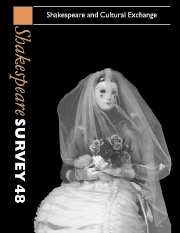Book contents
- Frontmatter
- Shakespeare Translation as Cultural Exchange
- Shakespeare, Theatre Production, and Cultural Politics
- ‘Amphitheaters in the Body’: Playing with Hands on the Shakespearian Stage
- ‘Shakespur and the Jewbill’
- Wilhelm S and Shylock
- Pilgrims of Grace: Henry IV Historicized
- Holy war in Henry V
- Hamlet and the Anxiety of Modern Japan
- Hamlet’s Last Words
- Venetian Culture and the Politics of Othello
- ‘My Music for Nothing’: Musical Negotiations in The Tempest
- The Tempest and Cultural Exchange
- Caliban and Ariel Write Back
- Shakespearian Rates of Exchange in Czechoslovakia 1945–1989
- ‘Are you a Party in this Business?’ Consolidation and Subversion in East German Shakespeare Productions
- The Martyred Knights of Georgian Shakespeariana
- Shakespeare Performances in England, 1993–1994
- Professional Shakespeare Productions in the British Isles, January – December 1993
- 1 Critical Studies
- 2 Shakespeare’s Life, Times, and Stage
- 3 Editions and Textual Studies
- Books Received
- Index
2 - Shakespeare’s Life, Times, and Stage
Published online by Cambridge University Press: 28 March 2007
- Frontmatter
- Shakespeare Translation as Cultural Exchange
- Shakespeare, Theatre Production, and Cultural Politics
- ‘Amphitheaters in the Body’: Playing with Hands on the Shakespearian Stage
- ‘Shakespur and the Jewbill’
- Wilhelm S and Shylock
- Pilgrims of Grace: Henry IV Historicized
- Holy war in Henry V
- Hamlet and the Anxiety of Modern Japan
- Hamlet’s Last Words
- Venetian Culture and the Politics of Othello
- ‘My Music for Nothing’: Musical Negotiations in The Tempest
- The Tempest and Cultural Exchange
- Caliban and Ariel Write Back
- Shakespearian Rates of Exchange in Czechoslovakia 1945–1989
- ‘Are you a Party in this Business?’ Consolidation and Subversion in East German Shakespeare Productions
- The Martyred Knights of Georgian Shakespeariana
- Shakespeare Performances in England, 1993–1994
- Professional Shakespeare Productions in the British Isles, January – December 1993
- 1 Critical Studies
- 2 Shakespeare’s Life, Times, and Stage
- 3 Editions and Textual Studies
- Books Received
- Index
Summary
A quick inspection of current titles in Shakespearian criticism suggests that theory has now come of age. The new historicism, gender-related approaches and contextual studies dominate, and equal attention is given to restoring the profile of Shakespeare’s neglected contemporaries. It would appear as if the margins of the text have finally subsumed the dramatist. A closer investigation, however, highlights the continuing vitality of author-centred readings and the ways in which Shakespeare serves as a prompt for wider-ranging cultural interpretations. Critical efforts are focusing increasingly upon appropriations of Shakespeare, shifting interest away from the Renaissance itself and towards its importance for a later generation of writers and producers.
In recent years the new historicism, cultural materialism and varieties of materialist feminism have altered the complexion of Renaissance scholarship, and, taking their cue from previous publications, these newer assessments see Shakespeare as one discursive strand in a larger, contradictory cultural matrix. Prominent among the latest group of studies indebted to the new historicism must stand Jean E. Howard's The Stage and Social Struggle in Early Modern England (Routledge, 1994), an exciting account of the controversial place of the theatre, puritan polemic against plays, and the ideological and political uses of spectacle. Exploring such dramas as the histories, Much Ado About Nothing and Thomas Dekker's The Whore of Babylon, Howard unpicks the dangerous meanings embodied in cross-dressing while also arguing for the empowerment of women attending contemporary playhouses.
- Type
- Chapter
- Information
- Shakespeare Survey , pp. 256 - 268Publisher: Cambridge University PressPrint publication year: 1996

